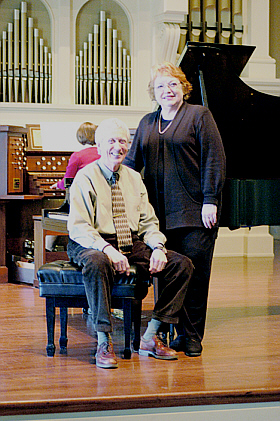Peabody's Phyllis Bryn-Julson, regarded by many as the
most authoritative vocal interpreter of 20th-century music,
will give her final performance of Schoenberg's Pierrot
Lunaire on Tuesday, March 29, in the institute's Friedberg
Hall.
For Bryn-Julson, the event also will mark her
second-to-last-ever performance, as she draws to a close a
four-decades-long professional career that has brought her
reams of praise and honors. She will officially give her
farewell at a concert at Washington's Kennedy Center in
May.
To honor her work and career, an exhibition titled
"Phyllis Bryn-Julson, Reigning Diva of 20th-Century Music"
is on view in the school's Arthur Friedheim Music Library
and Bank of America Mews Gallery through April 30. The
collection of documents and photos traces Bryn-Julson from
her early days growing up in a small town in the Midwest
right up to the present.
Bryn-Julson, 60, who will continue to teach at Peabody
and chair its Voice Department, said that while she has
enjoyed the ride, she knows it is time for her to step
aside from the stage.
"I'm tired of travel and airplanes, and there are
other things I want to do with my time," she said. "I don't
want to be worried about weather all the time and what it
might do to my voice. And it's always better to say
farewell yourself, before someone else tells you to get off
the stage."

Bryn-Julson with her husband,
Donald Sutherland of the Organ Department.
PHOTO BY HIPS / WILL KIRK
|
Gifted with a lustrous voice, Bryn-Julson has appeared
with every major European and North American symphony
orchestra and performed in cities around the world. She
also has more than 100 recordings and CDs to her credit,
including a performance of Schoenberg's Erwartung that won
the 1995 best opera Grammaphone Award.
She has premiered works of many 20th-century
composers, including Messiaen, Goehr, Kurtag, Holliger,
Tavener and Pierre Boulez, with whom she collaborated for
much of her career. Many composers have written
specifically for her, so captivated were they by her rare
vocal abilities.
Born in North Dakota, Bryn-Julson began studying the
piano at age 3. One of five children of Norwegian parents,
she learned early on that she had a special talent, which
she would later discover included a three-octave range and
perfect pitch.
She moved to Minnesota at the age of 8 and later
enrolled in Concordia College in Moorhead, Minn., studying
piano, organ, voice and violin and performing with the
renowned Concordia Choir. She later transferred to Syracuse
University, studying voice with Helen Boatwright.
She was "discovered" by Gunther Schuller, who would
attract her to the Tanglewood summer music festival, in
which she participated from 1964 to 1967. In 1964, she made
her professional debut, at the age of 19, at Carnegie Hall
in New York.
She came to Peabody in 1984, joining her husband,
Donald Sutherland, who is coordinator of the Organ
Department. She previously had taught for 13 years at the
University of Maryland, College Park.
Bryn-Julson's first performance of Pierrot Lunaire, at
the Norton Simon Museum Theater in 2000, drew rave reviews.
Alan Rich, music critic of Los Angeles Weekly, said that
"Bryn-Julson didn't so much sing the music — with its
dazzling, intricate intermix of speech, song and the
infinity of gradations in between — as carry it into
a whole new dimension."
Pierrot Lunaire is an eclectic melodrama consisting of
poetry spoken and sung (in German) against an instrumental
background. The seminal work, which premiered in Berlin in
1912, is the story of a man's journey from innocence to
experience told through three characters, Pierrot,
Brighhella and Columbine.
"It was a work that really opened the door to what a
voice could do," Bryn-Julson said. "Its 21 songs include
about as much experimentation as one could imagine. It's a
masterpiece for voice that broke all the rules."
Bryn-Julson's two recordings of Pierrot have been
highly praised, and she recent-ly finished a handbook for
singers, co-authored with Paul Mathews, dealing with the
theoretical and performance style of the work.
Pierrot Lunaire is scored for speaker, flute, clarinet
and a trio. Collaborating with Bryn-Julson will be Marina
Piccinini, flute; Charles Neidich, clarinet; Violaine
Melancon, violin; Michael Kannen, cello; and Seth Knopp,
piano. The event is part of Peabody's season-long focus
called the Second Viennese School Series.
Tickets for the concert are $18 for general admission,
$10 for senior citizens and $8 for students with ID. To
order, call the Peabody Box Office at 410-659-8100, ext.
2.